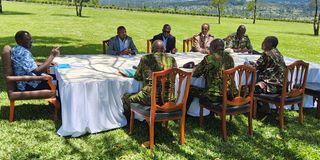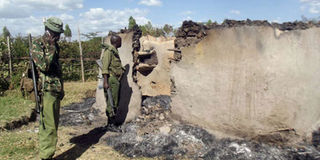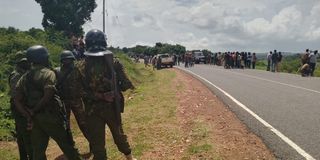
President William Ruto chaired a high-level security meeting in Trans Mara, Narok County on Saturday.
When President William Ruto chaired a high-level security meeting in Trans Mara, Narok County over the weekend, pictures of a vast lush green background surrounded by the Lolgorian Hills caught the eyes of Kenyans.
The meeting with Interior and Administration of National Government officials was one of the many held at his Trans Mara home, a land formerly owned by former Vice President Joseph Murumbi.
But beyond the calm and beautiful serenity depicted by the photographs posted on President Ruto’s social media pages after the meeting, is a disturbed region experiencing sporadic skirmishes that have seen the area lag in development.
Trans Mara West, East, and the newly created Trans Mara South Sub-County is a region crying for peace despite being home to two of the most prominent men in Kenyan history.
Former President Uhuru Kenyatta also has a home in this region, far from Ruto’s. Both are near the famous Maasai Mara National Reserve, where millions of tourists flock every year to watch wild animals, including the spectacular wildebeest migration.
Despite this great attribution of the Trans Mara region, deep-rooted, unending inter-clan and intercommunity clashes have seen the area at war with itself and its neighbours from time to time.
Given the bad history of the recurrent skirmishes, it was ironic that President Ruto chose it as a venue for the security meeting that touched on restoring peace in the North Rift, while the security of the very region he sat in is wanting.
Speaking in a different meeting in Trans Mara recently, the Head of State decried the deteriorating security of (Trans Mara), warning that he will no longer condone the flare-ups, often caused by petty reasons.

A file photo of houses burned during clashes in Pimbinyiet at the Transmara East-Transmara West border of Narok County. At least 10 houses were torched under similar circumstances in Transmara West on April 7, 2020. PHOTO | RUTH MBULA | NATION MEDIA GROUP
Repeatedly and sporadically, tussles over the border between Siria and Uasin Gichu clans of the Maasai community have led to injuries, destruction of property and multiple deaths.
The clashes between the two clans have raged on for close to five decades with no tangible solution in place.
The skirmishes along the Nkararo-Enooretet boundary keep flaring up despite efforts by successive governments to end it.
Warriors who are often armed with spears, bows, arrows, machetes, and lately guns, use the slightest provocation to start fighting.
Last month’s clashes were reportedly ignited by members of one clan farming across a boundary put by the government three years ago to separate the two groups.
During the war, several people are reported to have died while others sustained serious injuries and are recuperating.
The President underscored that the nation has grieved enough following the death of mothers, fathers and children in the region over a contested piece of land that everyone will eventually die and leave behind.

Security officers in Trans Mara South, Narok County, quelling a conflict between two warring communities after members of one community released one of their own from Lolgorian police station. The suspect was linked to the death of a police officer.
“30 hectares of land should not make us grieve. I had initially ordered my cabinet secretary to put up a police station in the area but the problem (of insecurity) is back again. I will send CS (Kithure) Kindiki again,” he promised.
In the same breath, he explained that the government’s interventions can never resolve the conflict permanently if members of the community do not take part in dialogue.
“The problem can be resolved by the elders. As a government, we will ensure that property and life is protected but some issues can be solved at the community level and the Ministry of Interior will work with you to ensure that peace is restored,” he said.
Further, the President highlighted Narok County’s tourism potential, noting that it was part of the reason he used his tour of the region to ground-break the construction of Utalii College, Iildolisho Campus to help generate professionals for the industry.
Kenya received 2.2 million tourists in the last year, he said, explaining that his administration is keen to increase the number to three million by the end of this year and to five million by the expiry of his first term in office.
“With many tourists, many opportunities for young people will be available, hence the growth of the economy. I have toured various places on earth to market our country and removed hindrances like Visa to make it easy for tourists to come,” he said.

President Uhuru Kenyatta and Deputy President William Ruto.
Last month, there were also intercommunity clashes in Trans Mara, along the Angata-Barrikoi-Gwetembe border of Narok and Migori counties.
One of the victims was Joseph Ntagira from Kuria East region, who had an arrow lodged in his back, right next to the spinal cord.
Despite the pain, he managed to recount how tens of young men, armed with bows and arrows, ambushed him and others at a maize plantation.
"About 50 young men ambushed and attacked us at a maize plantation and drove away our cattle," said the victim.
Daniel Soi of Trans Mara asserted that the government should grant "us our boundary of 1920 if the current one between Narok and Migori is unknown".
In December last year, members of one community managed to release one of their own from Lolgorian Police Station after the suspect was linked to the death of a police sergeant.
The incident sparked fresh inter-communal violence amongst the Maasai and Kalenjin communities living along the conflict-prone Ongata-Barrakoi border.
The then Narok County Commissioner Isaac Masinde associated the conflict with land disputes in the area.
"The skirmishes here are about the police officer who was attacked following a dispute over a land he bought from our Maasai neighbour. He was attacked and taken to Tenwek Hospital, but when he was brought back the attacker was arrested and the community moved to the station to protect him and demand his immediate release," said Gabriel Mibei, a resident.
The lead suspect, Ole Tigiran, was arrested and locked at Lolgorian Police Station but some members of one of the warring communities, armed with guns and crude weapons, stormed the station and demanded his unconditional release on cash bail, narrated the County Commissioner.
A section of members of the other rival community emerged, up in arms, to counter the other one at the police station.
"It immediately stirred skirmishes between the two rival communities leading to the shooting of four victims and many others suffering crude weapon injuries. The victims were later treated at Lolgorian Dispensary and discharged," said Mr Masinde.









